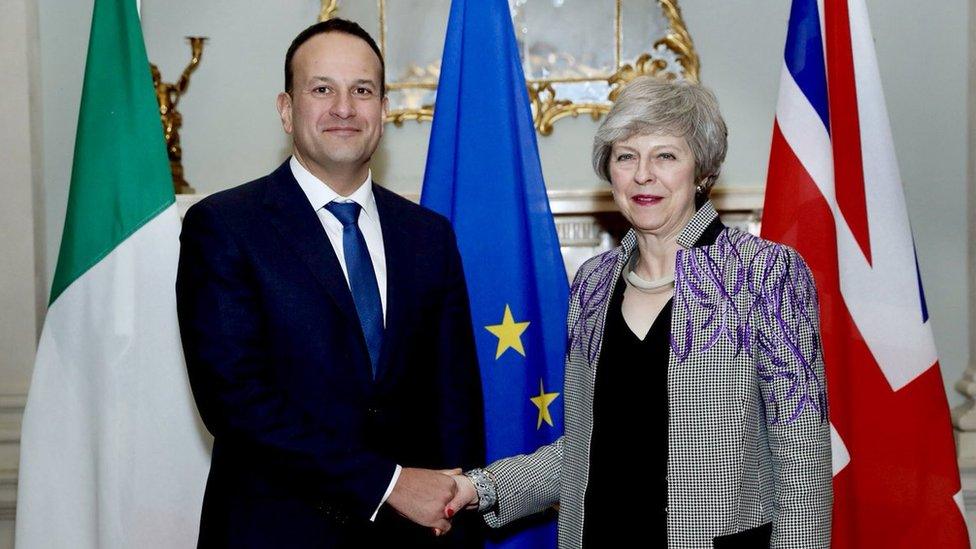Brexit: Theresa May to give MPs update on Tuesday
- Published
- comments
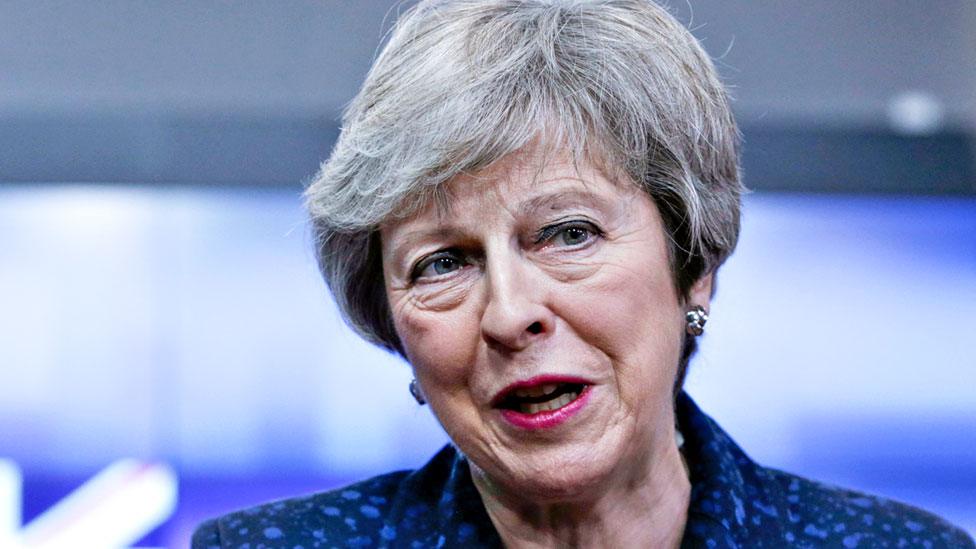
Theresa May will update MPs on Tuesday about recent Brexit talks as she continues to seek support for her deal.
She visited Dublin and Brussels last week seeking EU agreement on changes to the backstop - the "insurance" policy to avoid the return of visible Northern Ireland border checks.
Last month MPs - who will debate Brexit on Thursday - voted for the PM to find alternatives to the current backstop.
But the EU has said it would not renegotiate the withdrawal agreement.
However, efforts to come up with a solution acceptable to both sides continue.
Brexit Secretary Steve Barclay met a group of Tory MPs working on possible alternatives to the backstop, before he travelled to Brussels and held talks with EU negotiator Michel Barnier.
Following the meeting, Mr Barnier said the talks had been "constructive", but added it was "clear from our side we're not going to reopen the withdrawal agreement, but we will continue our discussions in the coming days".
A statement from the Department for Exiting the European Union said Mr Barclay and Mr Barnier had agreed to further talks "in the coming days". Their teams would continue to work in the meantime "on finding a way forward", it added.
The statement to the House of Commons on Tuesday - a day earlier than had been expected - follows an exchange of letters between Mrs May and Jeremy Corbyn.
The Labour leader wrote to the PM on Wednesday, external with a list of five demands to secure his party's support for her deal, including a permanent customs union.
The prime minister struck a conciliatory tone in her response overnight and said she looked forward to the two parties meeting again "as soon as possible" to discuss ways forward on Brexit.
But No 10 said it rejected any proposals to remain in a customs union with the EU.
Some of her cabinet members also quashed the idea, with International Trade Secretary Liam Fox calling Mr Corbyn's proposal a "dangerous delusion".
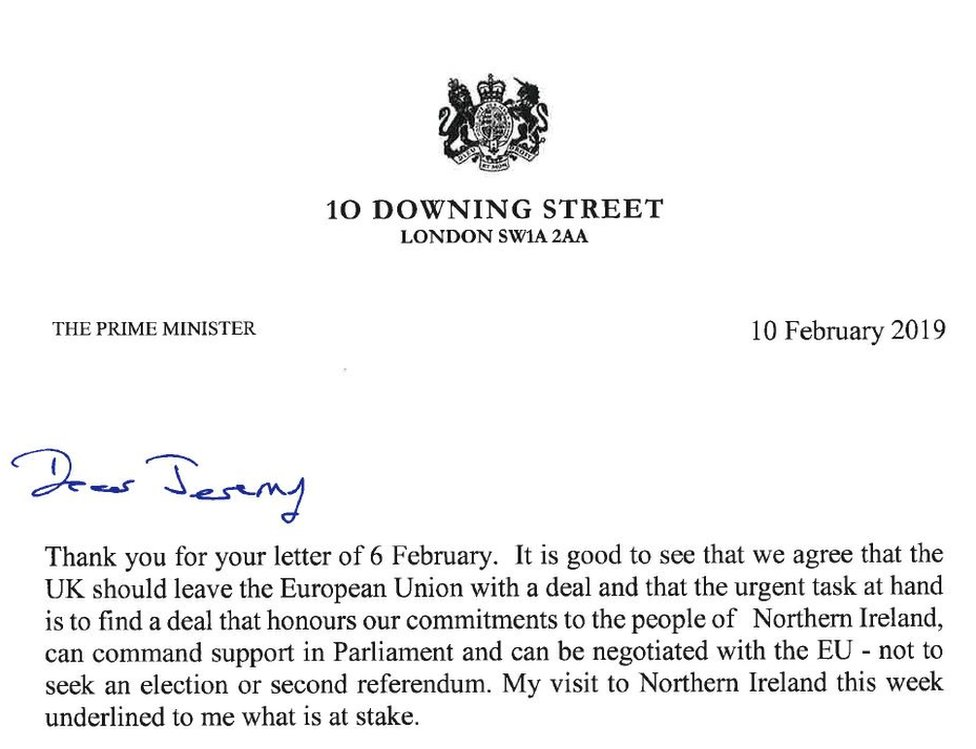
Mrs May told the Labour leader: "It is good to see that we agree that the UK should leave the European Union with a deal and that the urgent task at hand is to find a deal that honours our commitments to the people of Northern Ireland, can command support in Parliament and can be negotiated with the EU - not to seek an election or second referendum."
This is despite Mr Corbyn repeatedly saying there should be a general election if Mrs May cannot get a deal through Parliament. He has also faced pressure from some of his MPs to push for another public vote on Brexit.
Shadow Brexit Secretary Keir Starmer said his "key question" about Mrs May's response was: "Is she prepared to move her red lines and find a consensus?"
"I don't see that in the letter," he said.
"The point of the exercise was to say, look, there is a majority for a close economic relationship, if you're prepared to try to find it, and I've said for some time we should test that by having a vote on a customs union."
Allow X content?
This article contains content provided by X. We ask for your permission before anything is loaded, as they may be using cookies and other technologies. You may want to read X’s cookie policy, external and privacy policy, external before accepting. To view this content choose ‘accept and continue’.
Labour MP David Lammy - who supports the "People's Vote" campaign for a new referendum - said Mrs May's letter "makes it clear there is no hope of her agreeing" with Mr Corbyn's demands and said his party should campaign now for a fresh vote.
But fellow Labour MP Lisa Nandy told the BBC's Politics Live that there were between 40 and 60 of her colleagues "who are actively looking for ways to support" a revised Brexit deal.
She said the government needed to "get serious" about policy on a customs union and guarantee to "legislate for the protections around workers' rights".
Lisa Nandy says 40 to 60 Labour MPs ”actively looking for ways to support" a new Brexit deal
The anti-Brexit Liberal Democrats said it was "astonishing" the two leaders were starting "serious discussions about delivering disastrous Brexit together" 900 days after the vote to leave the EU.
Brexit spokesman Tom Brake added: "It is time for Jeremy Corbyn to give up the letters and instead draw his attention to Labour Party policy and get behind the campaign for a People's Vote."
The GMB union criticised the government's "dangerous brinkmanship" after Mrs May rejected remaining in a customs union. It has urged the extension of Article 50 - the mechanism by which the UK is set to leave the EU on 29 March.
Meanwhile, speaking in Luxembourg, Mr Barnier said he would judge how interested the UK was in changes to the accompanying political declaration, which sketches out the shape of the future relationship.
He said the EU was waiting for a clear and stable majority to emerge in the House of Commons, not just for the passage of the withdrawal agreement, but for the subsequent legislation too.
Mr Corbyn's letter to the prime minister was "interesting in tone and substance", Mr Barnier said.
Elsewhere, members of the Alternative Arrangements Working Group - including Conservative MPs Steve Baker, Marcus Fysh, Owen Paterson, Damian Green and Nicky Morgan - met government officials in Westminster.
Mr Baker said the talks had been "constructive" and they were "looking forward to hearing how Stephen Barclay gets on with Michel Barnier".
The group has met several times to discuss alternative arrangements to the proposed Irish border "backstop".

Does the letter give political cover?
By Norman Smith, BBC assistant political editor
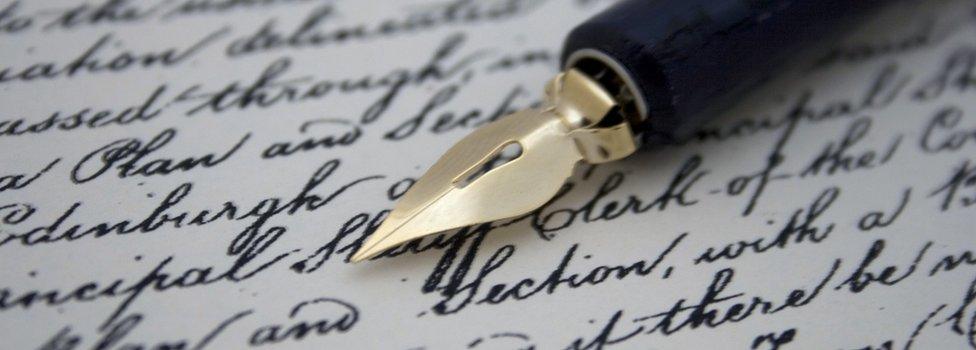
It could have been a very different sort of letter.
Mrs May could have just underscored her red lines: No to extending Article 50. No to another referendum. No to a customs union.
Instead, it's a much more conciliatory and consensual letter.
There's praise for Mr Corbyn in accepting the priority now should be on reaching a Brexit deal, rather than pressing for a general election.
Praise too for his acknowledgement that the backstop has got to be changed.
And there's some movement on employment rights and the promise of more cash for hard pressed communities.
Even on the customs union - their key dividing area - Mrs May's language is more nuanced, even though privately her aides insist there can be no question of accepting a permanent customs union.
It's unlikely to be anywhere near enough to win over Mr Corbyn.
But it may be enough for those Labour MPs in leave supporting constituencies, who are looking for political cover to back or abstain on Mrs May's deal.

What has Labour asked for - and how has the PM responded?
In his letter, Mr Corbyn asked for five changes to be made to the Brexit deal.
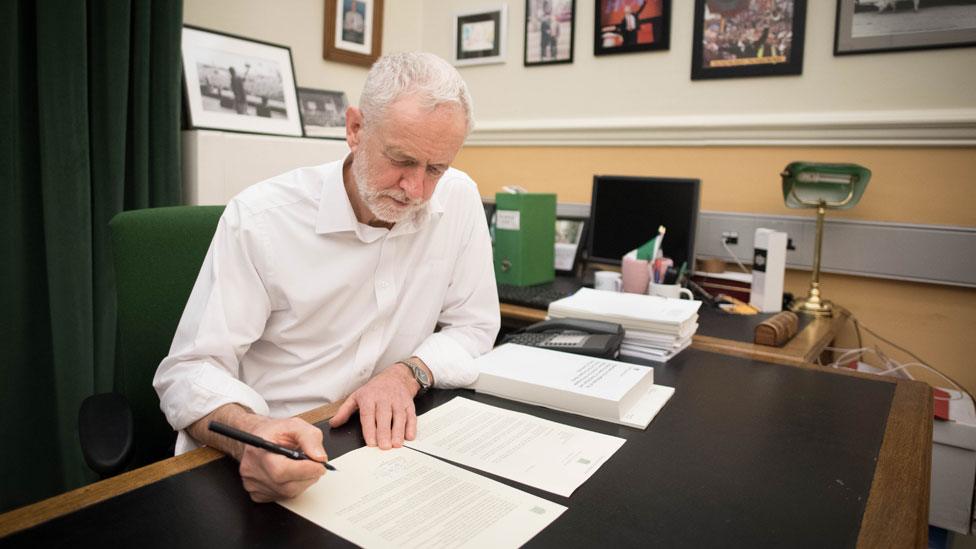
The customs union
The Labour leader called for a "permanent and comprehensive UK-wide customs union" with the EU to be introduced to the deal, with the same external tariff.
He said it would give the UK a say on any future trade deals that the EU may strike.
In her reply, Mrs May said the political declaration - the second part of her deal which is a non-legally binding statement on the future relationship between the UK and EU - "explicitly provides for the benefits of a customs union", with no tariffs, fees, charges and restrictions.
But, she said, it also allows for the UK to strike up its own trade deals elsewhere.
She added her reassurance that securing frictionless trade with the EU was "one of our key negotiating objectives".
Speaking in Switzerland, where Mr Fox has just signed a deal to see the country trade with the UK on the same terms it does now, the minister said the idea was "not workable".
The Single Market
Mr Corbyn also wanted the deal to include a promise for the UK to be closely aligned with the Single Market after it leaves the EU, "underpinned by shared institutions and obligations".
Mrs May quoted the EU as saying the current deal provides for the closest relationship possible outside the Single Market.
She added: "I am not sure what exactly you mean when you say 'shared institutions and obligations', but our teams can explore that."
The PM also repeated the EU's warning that completely frictionless trade is only possible if the UK stays in the Single Market.
"This would mean accepting free movement, which Labour's 2017 General Election manifesto made clear you do not support," she added.
Workers' rights
Labour has called for the UK to stay in step with the EU on rights and protections for workers, which was included in Mr Corbyn's letter.
On this point, Mrs May said the government had already made commitments on workers' rights, adding: "We are examining opportunities to provide further financial support to communities that feel left behind."
This could be referring to proposals that were said to have been discussed earlier this month from a group of Labour MPs in predominantly Leave-supporting constituencies, to allocate more funds to their communities for big infrastructure projects.
The PM also said that while she had "always been clear that Brexit should not be at the expense of workers' rights or environmental protections", she did not support automatically following EU rules in these areas.
EU agencies
The Labour leader called for a promise to participate in EU agencies and funding programmes on the environment, education and industry regulation after Brexit.
The prime minister said the government supports participation in EU programmes in a number of areas, as set out in the political declaration - which includes areas such as science and innovation, youth, culture and education, and overseas development.
Security
Finally, Mr Corbyn demanded agreements with the EU on security, such as access to the European Arrest Warrant database.
Mrs May said the government "shares your ambition in relation to security arrangements".
She said the political declaration secured agreement on the exchange of Passenger Name Record, DNA, fingerprint and vehicle registration data and on arrangements "akin to the European Arrest Warrant to surrender suspected and convicted persons efficiently and expeditiously."
But, she added, there is a challenge that as a third country outside of the EU, there are restrictions on the UK's ability to participate in some EU tools and measures.
Labour is yet to respond to the letter.
- Published10 February 2019
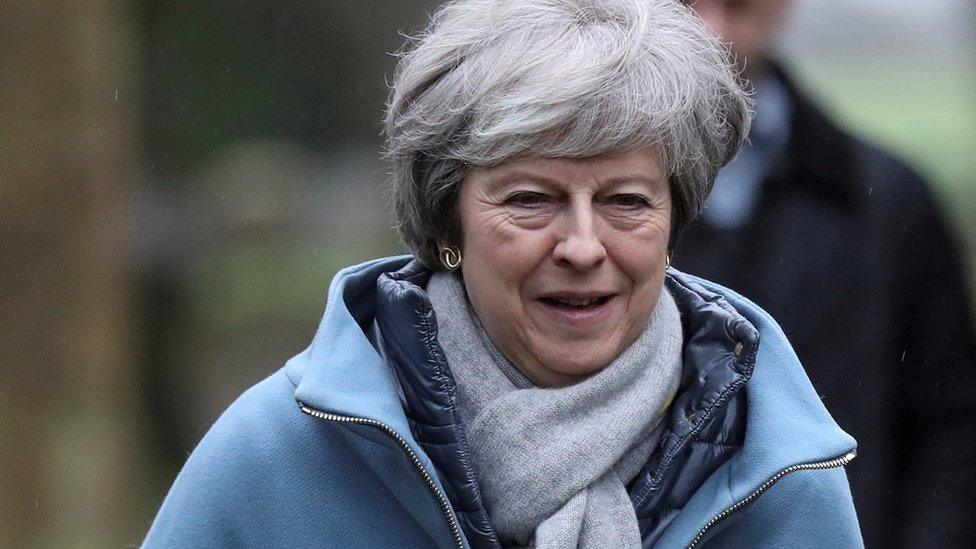
- Published7 February 2019
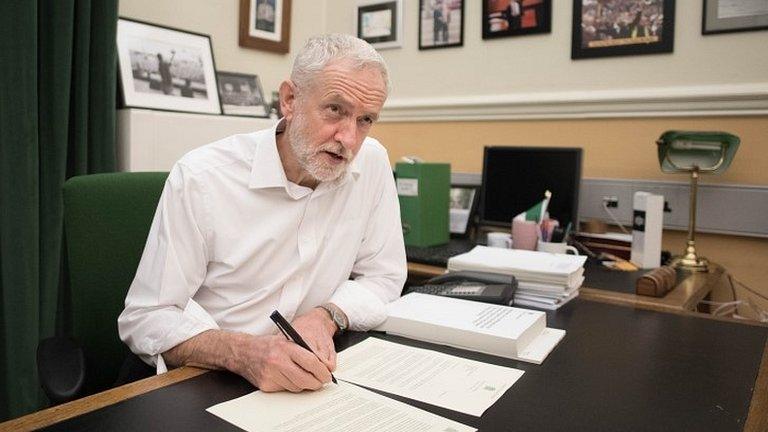
- Published8 February 2019
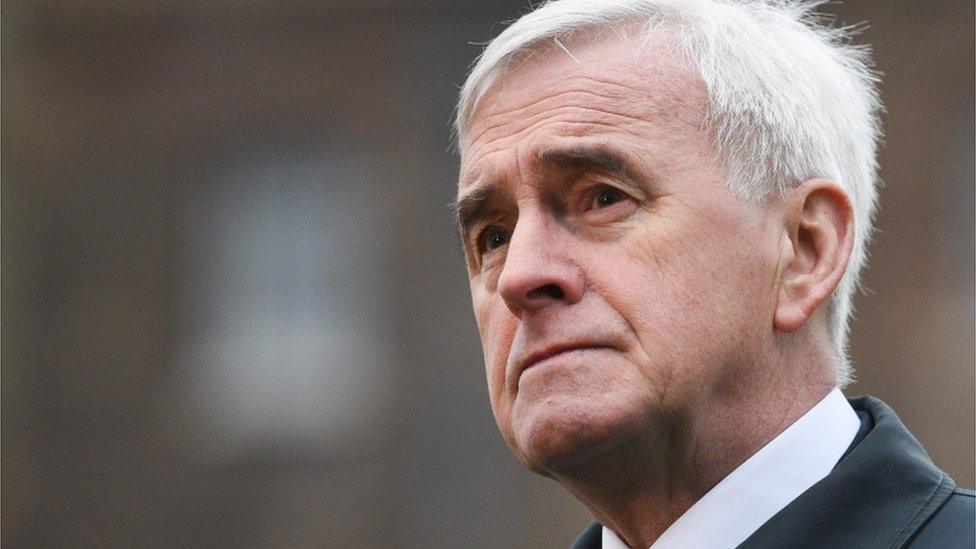
- Published8 February 2019
